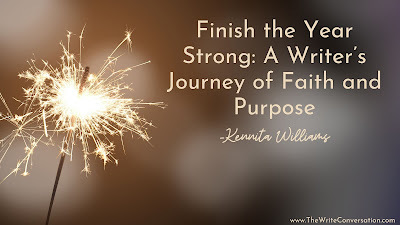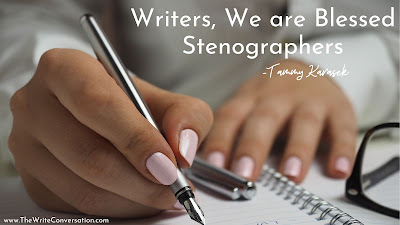Edie Melson's Blog, page 30
December 17, 2024
Finish the Year Strong: A Writer’s Journey of Faith and Purpose

by Kennita (Kay) Williams
As the year draws to a close, many of us writers find ourselves reflecting on unfinished projects, unmet goals, and dreams that feel distant. But take heart—God is still at work in your life and in your writing. Philippians 1:6 reminds us:
“Being confident of this, that He who began a good work in you will carry it on to completion until the day of Christ Jesus” (NIV).
Even if this year has not gone as planned, know that God’s timing is perfect. He finishes what He starts.
Here is a five-step guide for writers on God’s mission to finish the year strong.
Step 1: Remember the Call
I stared at my unfinished manuscript, overwhelmed by life’s constant demands. Writing felt like an impossible task. One night during prayer, I was reminded of God’s words in Habakkuk 2:2:
“Write the vision and make it plain.”
I realized my writing was not just a personal goal—it was a divine calling. My words were meant to uplift, inspire, and plant seeds of hope. With renewed purpose, I wrote this verse on a sticky note and placed it near my workspace.
Encouragement: Reconnect with God’s call on your life as a writer. Your words carry power and purpose. When you feel stuck, remember that you are fulfilling a mission bigger than yourself.
Step 2: Commit to the Process
Motivated by this renewed sense of purpose, I created a realistic writing schedule—one hour every evening. Some days were productive; others felt fruitless. But I stayed committed, trusting God to breathe creativity into my efforts. Colossians 3:23 became my guiding verse:
“Whatever you do, work at it with all your heart, as working for the Lord.”
Slowly but surely, chapters started coming together. Writing was not about perfection—it was about showing up consistently and allowing God to work through me.
Encouragement: Discipline transforms dreams into reality. Commit your writing time to God, even when inspiration feels distant. Trust Him to multiply your efforts.
Step 3: Overcome Obstacles with Faith
Challenges came like a flood—family emergencies, personal struggles, and waves of doubt. I wondered if I was the right person for this task. Was I truly called to write?
In a low moment, a trusted friend reminded me of Philippians 1:6:
“He who began a good work in you will carry it on to completion.”
With renewed faith, I pressed on. Each obstacle became a steppingstone toward the finished work God had in mind.
Encouragement: Trust that God equips you for the assignments He gives you. Obstacles are not meant to stop you—they build the perseverance needed for the next level of your calling.
Step 4: Find Strength in Community
Feeling drained and isolated, I joined a local Christian writers’ group. Their prayers, feedback, and encouragement lifted my spirits. We became a support system, united in our shared mission to spread God’s Word through our writing. Ecclesiastes 4:9-10 came alive for me:
“Two are better than one… if either of them falls, one can help the other up.”
Together, we prayed over our projects and celebrated milestones. Community turned loneliness into strength.
Encouragement: Surround yourself with like-minded believers who share your mission. Community provides accountability, wisdom, and the encouragement needed to finish strong.
Step 5: Trust God with the Outcome
Thanksgiving week, I typed the final sentence of my book. Tears streamed down my face—not from exhaustion, but from gratitude. God had guided every step of the journey.
My role was to be faithful; the outcome was always in His hands. Ephesians 3:20 filled my heart:
“Now to Him who is able to do immeasurably more than all we ask or imagine.”
I released my work to God, trusting Him to use it however He saw fit.
Encouragement: Finish strong by surrendering the outcome to God. Trust that He will use your writing in ways beyond what you can imagine.
5 Principles to Finish the Year Strong
Even if you feel behind, remember that God is still working. Here are five principles to help you close out the year with purpose:
1. Remember Who Holds Your Future
God is the Author of your life story. Trust that your delays aren’t denials. Jeremiah 29:11 reminds us:
“For I know the plans I have for you… plans to prosper you and not to harm you, plans to give you hope and a future.”
2. Refocus on the Goal
Do not let unfinished tasks define your progress. Look back with gratitude and forward with determination. Progress, not perfection, is what matters.
3. Renew Your Mind
Your mindset shapes your outcome. Speak life over your writing and replace negative thoughts with God’s promises. Romans 12:2 urges us to:
“Be transformed by the renewing of your mind.”
4. Rely on God’s Strength
You are not in this alone. When you feel weak, lean into God’s strength. Isaiah 40:31 promises:
“Those who wait on the Lord will renew their strength.”
5. Rejoice in the Process
Celebrate how far you have come. Every step is a victory worth praising God for. Gratitude fuels endurance, even in unfinished seasons.
Final Thought: Keep Writing with Purpose
Writers, as the year ends, remember that God has not forgotten you or your writing. Stay focused, trust His process, and move forward in faith. What He started in you, He will complete.
With God, nothing is wasted. Finish the year strong, knowing that your words, inspired by Him, have the power to change lives. Your best days—and best stories—are still ahead!
Key Scripture: “Being confident of this, that He who began a good work in you will carry it on to completion until the day of Christ Jesus.” – Philippians 1:6 (NIV)
TWEETABLEFinish the Year Strong: A Writer’s Journey of Faith and Purpose from Kennita (Kay) Williams on @EdieMelson (Click to Tweet)
Dr. Kennita “Kay” Williams is a Visionary Leadership Coach, Author, Resilience Expert, and Wellness Advocate. Through her Business/Ministry, Clear Vision, she empowers leaders to navigate challenges, gain clarity, and lead with purpose. Dr. Kay’s mission is to inspire wholeness and healing. She can be contacted at www.clearvisionleader.com
Published on December 17, 2024 22:00
December 16, 2024
Building Our Writing Brand with Authenticity and Consistency

by Katherine Hutchinson-Hayes @KHutch0767
A few years ago, I was at a crossroads. After many years in educational administration, I began my writing career in nonfiction. When the opportunity arose to write thrillers, I thought I needed to create two online personas. I’d even come up with a pen name. However, when I started working with a publicist, he discouraged me from doing so. He highlighted my hard work in building my brand as a Caribbean-pink-loving-devotional-writing-person-of-color. He encouraged me to stay true to who I am across genres. Although it felt like a bold venture, I’m grateful I took the leap.
Building a strong personal brand is essential in the crowded world of writers and creatives. Our brand is more than an aesthetic or a marketing strategy—it expresses who we are and what we stand for. Yet, it’s crucial to balance consistency in how we present ourselves with authenticity, staying true to our personality, values, and unique stories.
This balance is key for writers like me who write thrillers and devotionals. I embrace a feminine, pastel-inspired aesthetic but also serve up nail-biting drama. My brand isn’t about fitting into a mold but standing out by fully owning who I am.
Consistency in our branding creates recognition, trust, and reliability. Whether we’re promoting thriller novels or devotionals, maintaining visual and tonal coherence helps our audience know what to expect when they engage with our work.
Why Consistency Matters
1. Recognition: People remember patterns. Consistent colors, fonts, and imagery create a recognizable identity that people can associate with. Whether it’s a promotional post for a suspenseful thriller or a heartfelt devotional, a unique style ties everything together.
2. Trust: Readers trust creators who deliver reliably. Consistency in branding reassures our audience our message is thoughtful and intentional, building credibility over time.
3. Connection: A cohesive brand signals clarity and purpose, making it easier for people to understand and connect. Pairing this with consistent engagement strengthens our bond with readers, making them more likely to stick with us for the long haul.
Consistency in Practice Use similar design elements across platforms and projects (colors, fonts, or imagery).
Maintain a consistent voice, whether playful, reflective, or serious, tailored to the content but always authentic.
Show up regularly to engage with our audience—on social media, through newsletters, or in-person events.
The Power of Authenticity
While consistency creates structure, authenticity gives our brand its soul. Authenticity ensures our brand feels real and relatable, not a persona we’ve made to fit trends or expectations.
Stay True to Ourselves
Being authentic means embracing the fullness of who we are—even if it doesn’t fit traditional branding expectations. For example, as a girly girl who writes thrillers, I incorporate my Caribbean upbringing and lace-loving femininity into promoting dark, suspenseful stories. This blend creates memorable material and showcases the layers of my personality.
Similarly, my devotionals reflect transparency and a willingness to tackle raw, gritty topics, which adds another dimension to my writing. Readers value this honesty because it makes me real and approachable.
Why Authenticity Matters
1. It Sets Us Apart: No one else has our unique mix of perspectives, experiences, and interests. By being ourselves, we can create a genuinely one-of-a-kind brand.
2. It Attracts the Right Audience: Authenticity draws people who resonate with our voice and values. These are the readers who will become our most loyal supporters.
3. It Sustains Creativity: Pretending to be someone we are not exhausting. Authentic branding allows us to stay energized and passionate about our work because it aligns with who we truly are.
Blending Consistency and Authenticity
To build a writing brand that is both consistent and authentic: Embrace Our Unique Styles: We should lean into what makes us unique. Whether it’s pastel colors for promoting thrillers on social media or vulnerable honesty in devotionals, our true personalities should shine through. Adapt Without Losing Our Core: Tailor tone and approach to fit different projects (e.g., suspenseful for thrillers, raw for devotionals) while keeping our core identity intact. Engage Honestly: Respond to comments, share struggles, and celebrate victories with audiences in ways that reflect our values and voice. Create with Integrity: Whether crafting a novel or a social media post, we can ensure that our content reflects our experiences, beliefs, and goals.
Building a brand as a writer is about more than aesthetics or consistency—it’s creating a genuine connection with our audience. By staying true to ourselves while presenting our work consistently and polished, we can establish brands that resonate deeply.
Our brand isn’t just what we do—it’s who we are. By embracing our unique identity and committing to authentic engagement, we create a space where our readers feel both seen and inspired. That’s the kind of brand that lasts.
TWEETABLEBuilding Our Writing Brand with Authenticity and Consistency from @KHutch0767 on @EdieMelson (Click to Tweet)
 Dr. Katherine Hutchinson-Hayes is a review board member and contributor to Inkspirations (an online magazine for Christian writers), and her writing has been published in Guideposts. Her work in art/writing is distinguished by awards, including the New York Mayor’s Contribution to the Arts, Outstanding Resident Artist of Arizona, and the Foundations Awards at the Blue Ridge Mountains Christian Writer’s Conference (2016, 2019, 2021). She is a member of Word Weavers International and serves as an online chapter president and mentor. She belongs to FWA (Florida Writers Association), ACFW (American Christian Fiction Writers), CWoC (Crime Writers of Color),
Dr. Katherine Hutchinson-Hayes is a review board member and contributor to Inkspirations (an online magazine for Christian writers), and her writing has been published in Guideposts. Her work in art/writing is distinguished by awards, including the New York Mayor’s Contribution to the Arts, Outstanding Resident Artist of Arizona, and the Foundations Awards at the Blue Ridge Mountains Christian Writer’s Conference (2016, 2019, 2021). She is a member of Word Weavers International and serves as an online chapter president and mentor. She belongs to FWA (Florida Writers Association), ACFW (American Christian Fiction Writers), CWoC (Crime Writers of Color),AWSA (Advanced Writers and Speakers Association), and AASA (American Association of School Administrators). She serves on the nonprofit organization Submersion 14 board and the 540 Writer’s Community board and is an art instructor for the nonprofit organization Light for the Future. Katherine hosts the podcast Murder, Mystery & Mayhem Laced with Morality. She has authored a Christian Bible study for women and is currently working on the sequel to her first general market thriller novel. Her thriller A Fifth of the Story will debut in February 2024 through Endgame Press.
Katherine flourishes in developmental editing and coaching writers. She has a twenty-year career in education, leadership, and journalism. Katherine freelances as an educational consultant for charter schools, home school programs, and churches. In this role, she has written and edited curriculum, led program development, and helped manage growth facilitating and public relations.
She also works as an editor and book coach through her consulting business. Katherine provides skill, accountability, and professionalism so clients can begin, develop, and finish their writing projects for publication.
Published on December 16, 2024 22:00
December 15, 2024
The First Marketing Tool for Writers: Your Short Pitch

by Karen Whiting @KarenHWhiting
Writers quickly learn the need for a great elevator pitch and proposal to land a book contract. It's the most basic marketing tool to selling the book to readers, as well as influencers, agents and editors. Beyond that, it's the thesis statement of your book and reason why you believe readers will buy it. As the golden nugget of marketing, it's also great to use to test the idea because it's short, simple, and quick to share.
Once you have a great pitch, test it on potential readers to see if it grabs their interest. If yes, then your pitch is ready. If not, it's back to editing the pitch.
This short pitch, often called an elevator pitch, boils the book down to its essence, highlighting the most compelling aspect of the contents, target readers, main reader benefits, and your qualifications to write it. The one-sheet, query letter, and proposal are longer pitches generally sent after garnering initial interest.
Prepping to Write the Pitch
Questions to answer1. Who are the readers and why will they want the book?2. What are the benefits for the reader. What is the most desired benefit?3. What is the most compelling concept in the book? 4. How will I market the book?
Elements of Effective Pitches
Once you answer these, start drafting the hook, the sentence that encapsulates the main concept, in a way that also reveals the audience.
A few tips on what to focus on:Hook that will engage curiosity and/or provide assurance of the outcome of reading the book.Audience that defines who most needs the book or buyer who most wants to gift it. Describe the target audience in a few words and be specific (not every woman or person)Biggest reader benefit provided that reflects how the words impact people or change lives. This shares the book’s value, or takeaway. It reveals the biggest gift the reader really needs.Author credibility that reveals experience, credentials, followers in category, or ability to market the book.
Developing the Pitch
Let's look at the process of one author's pitch crafting with one example, quick critiques, and rewrites.
First draft
This is a book for all married couples having problems. Practical tips show people how to heal and how to let God help them love again. When they learn to forgive, they can save their relationship. Real stories will let readers see how this really works.
Critique: The title is never mentioned, the audience is too broad, wording is awkward, and the biggest benefit is not clear.
Draft 2
The book shows couples facing divorce they change and save the marriage through forgiveness. It uses personal stories of couples who turned their lives around. Each story also lists ways people can let go of hurt and how to let the Lord heal them and bring them back to loving one another.
Critique: Better overall, but still no title named, and not the best or most specific word choices.
Draft 3
In The Arms of Forgiveness shows how married couples, on the verge of divorce, can be transformed through the power of forgiveness. Personal experiences of couples who made U-turns in marriage are paired with practical tips to help partners let go of hurting and allow the lord to heal the relationship and rekindle love.
Wow! The title, specific audience, and a well-defined promise are all given. Plus it reveals the contents that will draw in readers: real U-turn stories, practical tips, and the desired benefit or healing and renewed love.
Your Turn
Write the draft and then critique it. Ask yourself and others if the main points are clear, well-defined, and share the unique benefit if the book. Can they think of someone who needs the book or will want it? Rewrite until it reflects your vision and the reader's needs.
Test the Pitch
Share the pitch with your critique group and friends. The share it with people you meet. Notice how they react and respond. What questions do they ask. Do they indicate they can't wait for the book or only that it might be good for someone they know. Their words reflect the interest level and whether or not they see the book as a solution for themselves or a loved one. If needed, edit the pitch again.
Follow Up Prep
Be prepared to answer questions connected to the pitch.
Do you have the proposal ready? How much is written? When would a manuscript be completed? What are your marketing plans? What comes once the reader finishes the book? Do you have a focus group? How have you tested the concepts?
Those are some of the questions to expect once you pique the interest of an agent, editor, or even potential readers.
Write and rewrite until it's pitch perfect!
TWEETABLEThe First Marketing Tool for Writers: Your Short Pitch from @KarenHWhiting on @EdieMelson (Click to Tweet)
 Karen Whiting (WWW.KARENWHITING.COM) is an international speaker, former television host of Puppets on Parade, certified writing and marketing coach, and award-winning author of twenty-seven books for women, children, and families. Her newest book, The Gift of Bread: Recipes for the Heart and the Table reflects her passion for bread and growing up helping at her grandparent’s restaurant. Check out her newest book Growing a Mother’s Heart: Devotions of Faith, Hope, and Love from Mothers Past, Present, and Future. It's full of heartwarming and teary-eyed stories of moms.
Karen Whiting (WWW.KARENWHITING.COM) is an international speaker, former television host of Puppets on Parade, certified writing and marketing coach, and award-winning author of twenty-seven books for women, children, and families. Her newest book, The Gift of Bread: Recipes for the Heart and the Table reflects her passion for bread and growing up helping at her grandparent’s restaurant. Check out her newest book Growing a Mother’s Heart: Devotions of Faith, Hope, and Love from Mothers Past, Present, and Future. It's full of heartwarming and teary-eyed stories of moms.Karen has a heart to grow tomorrow’s wholesome families today. She has written more than eight hundred articles for more than sixty publications and loves to let creativity splash over the pages of what she writes. She writes for Crosswalk. Connect with Karen on Twitter @KarenHWhiting Pinterest KarenWhiting FB KarenHWhiting.
Published on December 15, 2024 22:00
December 14, 2024
Writers, We are Blessed Stenographers

by Tammy Karasek @TickledPinkTam
Certain words and phrases often catch my mind as a writer when I’m scrolling through a social media feed. Recently, I came across the quote below. In high school and college, I took many classes on shorthand and my classmates and I were referred to as stenographers. Not a word that is often seen or heard much anymore, so to read this word made me scroll to find it. I’ve contemplated it ever since. One, because of who wrote it and two because of the power that was in the words. Check it out:
“Writers were blessed stenographers taking divine dictation.” Stephen King
I was first intrigued because of his use of stenographer. A word strongly attached to my education in the past.
I remember sitting for hours taking shorthand in class in both high school and college. The teacher would read pages for us to write in those squiggly little shapes that translated into real words. I loved taking shorthand and won quite a few awards doing so—I was very fast. I found it both fascinating and fun. When I took my first job as a secretary, I put the training to use. I diligently wrote down the words my boss would speak whenever he needed correspondence sent. Jack, my boss, was a funny guy. Once he was done telling me what he wanted in his letter, he’d say, “Now read those little scribbles back to me.”
Back to Mr. King’s quote. It caught my attention that he had said “writers were blessed stenographers.” He’s talking about you and me—we are the writers. But he said we’re blessed stenographers. Which to me means One in the position to bless is the One telling us what to write. A stenographer doesn’t write letters in shorthand if someone isn’t telling him or her what needs typed. Someone is behind the voice. Who would be the voice for the blessed stenographer?
Mr. King’s last two words answers the question on who that would be, for Christian writers in particular. The voice would be someone divine dictating what needs to be said.
Stop right there. Did anyone else get goose bumps like I did?
We’ve heard the phrase “if God has called you to do something, He will equip you to do it.” The quote above takes that to a whole new level for me. God has called us to write. Check. He will equip us to do it. Check—wait … how?
Simple.
Through His divine dictation.
Now you can see why this short, sweet quote has had my attention. And I’m not lying when I say it came on one of those days we writers sometimes get when self-doubt and frustration wants to creep in and take over.
But this quote. It encouraged and excited me as soon as I read it. It is still rolling in my head weeks later. I hope it has lifted your spirits as well. We’re not in this writing journey alone, even though it sometimes feels like it. The words we write are coming from divine dictation from the One who blesses us with our stenographic skills of writing.
Be blessed writer, go write the words He dictates to you.
What are your thoughts on Mr. King’s quote? Have you ever thought about your writing journey as blessed through divine dictation? Do share with us!
TWEETABLEWriters, We are Blessed Stenographers from @TickledPinkTam on @EdieMelson (Click to Tweet)
 Tammy Karasek uses humor and wit to bring joy and hope to every aspect in life. Her past, filled with bullying and criticism from family, drives her passion to encourage and inspire others and give them The Reason to smile. She’s gone from down and defeated to living a “Tickled Pink” life as she believes there’s always a giggle wanting to come out! A writer of Romance—with a splash of sass. She’s also The Launch Team Geek helping authors launch their books and also a Virtual Assistant for several best-selling authors. Don't miss her recent book, LAUNCH THAT BOOK, just released in November.
Tammy Karasek uses humor and wit to bring joy and hope to every aspect in life. Her past, filled with bullying and criticism from family, drives her passion to encourage and inspire others and give them The Reason to smile. She’s gone from down and defeated to living a “Tickled Pink” life as she believes there’s always a giggle wanting to come out! A writer of Romance—with a splash of sass. She’s also The Launch Team Geek helping authors launch their books and also a Virtual Assistant for several best-selling authors. Don't miss her recent book, LAUNCH THAT BOOK, just released in November. Her work was also published in a Divine Moments Compilation Book—Cool-inary Moments. She’s also the Social Media Manager for the Blue Ridge Mountains Christian Writers Conference, Founding President and current Vice-President of ACFW Upstate SC, and Founding President of Word Weavers Upstate SC. She’s a writing team member for The Write Conversation Blog, Novel Academy, MBT Monday Devotions, The Write Editing and more. Connect with Tammy at HTTPS://WWW.TAMMYKARASEK.COM.
Published on December 14, 2024 22:00
December 13, 2024
Writers, Focus on Your One Significant Word in 2025

Beth Vogt @BethVogt
Has this year been a whirlwind for anyone else?
Last January seemed set to slow motion but after that, someone pushed the fast forward button. And now there are only 17 days left in 2024.
As the new year approaches, we can be caught in an emotional tug of war as we look back over our shoulder and recall personal and professional ups and downs. At the same time, we wonder what awaits us in 2025.
Some of us start the year with resolutions—a list of goals we want to accomplish. Me? I’m an advocate for choosing One Word for the upcoming year. Making the “I will” and the “I won’t” list seems so positive, but I always lost my list of resolutions by February and could never remember half the things I wrote down.
This will be my 20th year choosing One Word to focus on for 365 days. Wow! Twenty years choosing a single word and never once have I lost track of the word I chose as the days, weeks, and months progressed. Even more important, God has used the process of focusing on a specific word to change me in significant ways that influence all areas of my life—spiritual, emotional, mental, and physical.
Some of my One Words have been: GratitudeHopeKindnessTrustConfidenceInheritanceSimplify—which morphed into SurvivePrayForgivenessListen
Last year, my One Word was “rest,” and for the third year I ordered a necklace with my word engraved on it. A close friend also sends me a small, framed image of my One Word that I keep in a central location—on my kitchen counter or on my desk.
This year my One Word is “Abide.” I knew what my One Word for 2025 would be by September. (It happens sometimes.) I’m part of an online Bible reading program, Stop2Read ( http://www.Stop2Read.com). When we read through John, this verse stood out to me: “I am the vine, you are the branches; he who abides in Me and I in him, he bears much fruit, for apart from Me you can do nothing.” (John 15:5 NASB95) I’ve come back to the words: “… apart from Me you can do nothing …” again and again and I know abiding with God influences my work as a writer.
Here are four tips to help writers try One Word in 2025:Pray about your One Word. God usually provides me with a scripture verse that anchors me to my One Word.Be attentive for a visual. I’ve used a photo or other kind of graphic to remind me of my One Word. I’ve also worn a necklace or bracelet engraved with my One Word.Dive into your One Word. Consider reading books related to your One Word. The year I focused on the One Word gratitude, I incorporated a gratitude journal. Read My One Word by authors Mike Ashcraft and Rachel Olsen. This is a helpful resource to learn how to choose One Word. I also recommend checking out their website . It’s motivating to see One Words other people have chosen.
I’d love to know if you focus on One Word each year and if you’ve chosen a word for 2025 or why you prefer to do resolutions.
TWEETABLE Writers, Focus on Your One Significant Word in 2025 from @BethVogt on @EdieMelson (Click to Tweet)
 Beth K. Vogt believes God’s best often waits behind the doors marked “Never.” She’s authored 15 novels and novellas, both contemporary romance and women’s fiction. Beth is a Christy Award winner, an ACFW Carol Award winner, and a RITA® finalist. Her newest contemporary romance novel, Dedicated to the One I Love, released June 20, 2023. Her novel Things I Never Told You, book one in her Thatcher Sisters Series by Tyndale House Publishers, won the 2019 AWSA Golden Scroll Award for Contemporary Novel of the Year. An established magazine writer and former editor of the leadership magazine for MOPS International, Beth blogs for Learn How to Write a Novel and The Write Conversation and also enjoys speaking to writers group and mentoring other writers. She lives in Colorado with her husband Rob, who has adjusted to discussing the lives of imaginary people. Connect with Beth at BETHVOGT.COM.
Beth K. Vogt believes God’s best often waits behind the doors marked “Never.” She’s authored 15 novels and novellas, both contemporary romance and women’s fiction. Beth is a Christy Award winner, an ACFW Carol Award winner, and a RITA® finalist. Her newest contemporary romance novel, Dedicated to the One I Love, released June 20, 2023. Her novel Things I Never Told You, book one in her Thatcher Sisters Series by Tyndale House Publishers, won the 2019 AWSA Golden Scroll Award for Contemporary Novel of the Year. An established magazine writer and former editor of the leadership magazine for MOPS International, Beth blogs for Learn How to Write a Novel and The Write Conversation and also enjoys speaking to writers group and mentoring other writers. She lives in Colorado with her husband Rob, who has adjusted to discussing the lives of imaginary people. Connect with Beth at BETHVOGT.COM.
Published on December 13, 2024 22:00
December 12, 2024
Holiday Gift Ideas for Writers

by Lilka Raphael @Lilka_Raphael
With the holidays looming, finding the perfect gift can be tricky. Whether you are shopping for your true love or best friend, here are gift ideas at different price points for the writers in your life.
JournalsJournals are great for logging everything from professional aspirations to spiritual musings. Some writers keep a book of ideas handy wherein they can quickly take note before a thought or observation slips away. The addition of a nice pen to accompany a bound journal can elevate your gift into something memorable.
Voice RecorderThe more writers I meet, the more I hear them talk about using voice recorders to capture ideas when a journal or keyboard is not practical. Some authors draft entire books using recorders. One author I know keeps one at her bedside to capture ideas that come calling at night. Voice recorders can be found with an array of features and in different price ranges.
DictionaryThough hardly an exciting gift, a dictionary can be a godsend for non-fiction writers. A passion to write doesn’t always equate to an innate gift with words. Although online editions are readily available, some writers prefer to turn pages. A hardcopy edition that includes a thesaurus is a gift that will keep giving through the decades. Merriam-Webster’s Dictionary on English Usage is particularly useful for clarifying confusing words that are often interchanged incorrectly. Consider personalizing this gift by writing a few kind words about the author inside the cover.
SubscriptionsA subscription to a favorite magazine or specialty publication is always appreciated. There are also subscriptions to online services and references such as the Christian Writers Institute or The Chicago Manual of Style that are helpful long after the holidays have past. With the multitude of resources available, you may have to ask which subscriptions are best suited for the recipient.
A Writing RetreatThis can vary from paying for conference fees to providing a couple of days of peace and quiet at home. An offer of free time is priceless. You can choose to offer this gift as a singular event or issue coupons that can be redeemed for multiple sessions.
BooksAs much as writers like to write, most of us would rather read. A book or two by a favorite author is always appreciated. If you want to gift more than books, consider the latest generation of e-book readers. These can store a library of favorite titles, and their features have improved through the years. An electronic reader eliminates notifications that can distract from the experience when compared to using a reading app on a device.
Whether you are shopping for someone dear or gifting yourself, enjoy the season. May your holidays be joyful and your words full of light.
I have shown you in every way, by laboring like this, that you must support the weak. And remember the words of the Lord Jesus, that He said, ‘It is more blessed to give than to receive.’ ” Acts 20:35 NKJV
TWEETABLEHoliday Gift Ideas for Writers from @Lilka_Raphael on @EdieMelson (Click to Tweet)
 A Florida native, Lilka Finley Raphael has been a licensed pharmacist for over thirty years. Her passions for writing, gardening, and photography prompted her to share her experiences and life lessons on her blogs B Is for Blessed and God, autism, & me. You can learn more about her at lilkaraphael.com
A Florida native, Lilka Finley Raphael has been a licensed pharmacist for over thirty years. Her passions for writing, gardening, and photography prompted her to share her experiences and life lessons on her blogs B Is for Blessed and God, autism, & me. You can learn more about her at lilkaraphael.comLilka’s greatest achievements are her two adult sons who have flown the nest. Happily married for thirty-two years, she lives east of Atlanta with her husband, Rod. They now share their home with two German Shepherds—Holly and Ivy—and one naughty kitty, Moxie.
Published on December 12, 2024 22:00
December 11, 2024
T'was the Night Before Book Launch Day

by Julie Lavender @JLavenderWrites
T'was the night before launch day, when all through her mind
Not a sentence nor fragment, nor words could she find.
To openly share her delight with the world.
As visions of picture books wriggled and swirled.
The children were nestled all snug for the night.
The author awaited the first morning light.
She’d waited and pondered and dreamed of success.
Of hearing a publisher answer with “Yes!”
She toiled with a pen and a typewriter too.
Read books filled with writing tips fresh and brand new.
Took classes and workshops from pros who knew best.
Then used extra muses to make up the rest.
More rapid than eagles the years came and went.
Computers brought fresh plans that felt heaven-sent.
She pecked and she poked and put words on the page.
And sent them by email ‘cause that was the rage.
Then what to her wondering eyes should appear.
An offer to publish—a book seems so near!
She spoke not a word but went straight to her work.
Rewriting and adding and tweaking a quirk.
A bundle of lawyerly words sealed the deal.
Her plan for a kids’ book was suddenly real.
A Gingerbread House went from thoughts to a dream.
A dream that grew bigger with joy and with gleam.
The artist picked colors and doodled with care,
And talent gave way to more spreads full of flare.
First dough filled with ginger and spices to smell.
And patterns of building a house that was swell.
The girl and her granddad cut four walls in all.
And topped with a gingerbread roof standing tall.
They nibbled on smidgens of crumbs for a snack.
While gingerbread pieces cooled off on a rack.
The bakers dabbed icing first here and then there.
While smells of warm gingerbread wafted the air.
A rainbow of candies bedecked every side.
With licorice pieces both narrow and wide.
But something was missing; the house wasn’t done.
A house is so lonely without anyone.
With more dough for cookies, she knew where to start.
She baked up a family to add to the art.
With cheeks just like roses and mouths in a bow
And noses like cherries and eyes white as snow.
The family looked happy; the house now complete.
Midst chaos and clatter and gingerbread feet.
Her publishing journey was reaching the peak.
So giddy and happy, she barely could speak.
She anxiously waited for dawn’s light to burst.
Her heart full of wonder, her picture book first.
She sprung to the door with the sound of a horn.
The little old driver so lively but worn.
He whistled and pointed and gave her that look.
She knew in a moment it must be her book.
Her head gave a nod as he drove round the bend.
It seemed like her journey was nearing the end.
She ripped off the wrapping and gazed with damp eyes.
A new children’s picture book – this is her prize.
A wink of her eye and a twist of her head.
“It’s just the beginning,” the proud author said.
“My dream that took years and hard work and much prayer.
Is now a new kids’ book forever to share.”
She snuggled all cozy, her dream in her hand.
A feeling so warm and delightful and grand.
“It’s launch day, my launch day, she said with such joy.
My dream lives in pictures for each girl and boy!”
TWEETABLET'was the Night Before Book Launch Day from @JLavenderWrites on @EdieMelson (Click to Tweet)
 Julie Lavender’s decades-long dream came true with the publication six weeks ago of her first children’s picture book. A Gingerbread House, published by End Game Press, celebrates family and togetherness, and the author thinks it’s the perfect holiday book for little ones. Julie is also the author of other books, magazine articles, and newspaper columns. Julie can’t wait to share her picture book with her five-year-old grandson and two new grandbabies in the last three months.
Julie Lavender’s decades-long dream came true with the publication six weeks ago of her first children’s picture book. A Gingerbread House, published by End Game Press, celebrates family and togetherness, and the author thinks it’s the perfect holiday book for little ones. Julie is also the author of other books, magazine articles, and newspaper columns. Julie can’t wait to share her picture book with her five-year-old grandson and two new grandbabies in the last three months.
Published on December 11, 2024 22:00
December 10, 2024
Holiday Relaxation Ideas for Writers

by Linda Gilden @LindaGilden
Thanksgiving has come and gone and now we are looking toward Christmas. As writers, most of us can use some time of relaxation and a break from our normal writing schedule. Several writers try hard to plan their schedules so they can take December off. I make a list of things I want to do when I have some “free time” to do things I don’t get done when I am working.
Relaxation means several things to writers. Here are a few suggestions in case you have not made a list during the year.
6 Ways Writers Can Relax During the Holidays1. Take a leisurely run or bike ride, being alert and aware of your surroundings that might work well as a story or part of a novel you may be working on. 2. Call a friend you haven’t seen in a long time and ask him or her to play a round of golf. 3. I love to sit and read books others have written. Now I am working on a novel, so I am reading mostly fiction and studying other writers as I read, taking notes of aspects of fiction writing that I need to work on. Even during times I am working on a book of my own or assigned articles, I usually read four or five books a week.4. If you have grandchildren or children and you feel you don’t get to spend a lot of time with them during the school year, plan a special day just for that child or grandchild. Make a big deal that it is their day. If they like to shop—shop. If they want to go to a trampoline park—go jump with them. If they like to go to the library—go help them pick out books. If they want to go to a ball game—grab your pompoms and go.5. You may also have friends you feel like you need to catch up with. Give them a call and chat for a while. Find out how their families have grown. Go to lunch or out for coffee. I have several friends I plan to reconnect with this December.6. Sit down with your husband and plan your family goals for 2025. If your family is anything like ours, we live by the calendar so we don’t miss anything.
Speaking of 2025, I would love to invite you to put the Carolina Christian Writers Conference 2025 on your schedule. The dates are March 7-8 in Greer, SC. The website is www.carolinachristianwritersconference.com and you can find out all about it there. If you have additional questions just let us know at info@carolinacwc.com . We would love to see you there. The early bird price goes until February 14. I would love to meet as many of our readers as possible and get to know what you are working on with your writing. If you have never been to a writers conference, let this be the year when you take a bold step with your writing and find a conference to attend. You may want to find a friend to travel and room with. It adds the element of a girls’ get-a-way.
When I came home from the first one I attended in 1990, I was so excited my children immediately exclaimed, “I think she’s been to writers paradise!” They were right. I had found my peeps.
Above all, spend some time thanking God for His gift of Jesus to us. No greater gift has ever been given. And, how blessed we are that he called us to be his print messengers. Let’s be faithful to what He has called us to do and give Him our best words to introduce others to Him.
“O Come let us adore Him, Christ the Lord.”
TWEETABLEHoliday Relaxation Ideas for Writers from @LindaGilden on @EdieMelson (Click to Tweet)
 Linda Gilden is an experienced, bestselling writer, speaker, award-winning editor, marketer, and speaking coach, ghostwriter, and writing coach. Author of 40 books and 2,000+ magazine articles, Linda appreciates a great story. She believes with our stories, we can change the world one word at a time and loves to encourage others to do that through writing coaching and personal tutoring. Her newest book was released in November: TRADING SHADOWS: EXCHANGING A LIFE OF SECRETS, FEAR, AND DOUBT FOR A LIFE OF FREEDOM WITH THE ALMIGHTY.
Linda Gilden is an experienced, bestselling writer, speaker, award-winning editor, marketer, and speaking coach, ghostwriter, and writing coach. Author of 40 books and 2,000+ magazine articles, Linda appreciates a great story. She believes with our stories, we can change the world one word at a time and loves to encourage others to do that through writing coaching and personal tutoring. Her newest book was released in November: TRADING SHADOWS: EXCHANGING A LIFE OF SECRETS, FEAR, AND DOUBT FOR A LIFE OF FREEDOM WITH THE ALMIGHTY.
Published on December 10, 2024 22:00
December 9, 2024
The Benefits of Brainstorming for Writers: Part 2

by Cindy K. Sproles @CindyDevoted
Last month we talked about the process of brainstorming. We discussed simple things that introduced you to brainstorming with a peer, but what if you don’t have that person handy to bounce ideas? Then you need a way to help you brainstorm alone. Brainstorming consists of physical, mental, and emotional techniques. Surprisingly enough, these things aren’t rocket science. Though NASA does it with their brainiacs all the time. Get a pencil and paper (I know, utensils to actually write with), and we’ll begin.
I’m serious about the pencil and paper! Really, I am. Our brains are unique little things. They love stimulation, exercise, and cognitive use. It’s the simplest of things that start that process. Since our brain is a muscle of sorts, it works best with movement. We’re a unique breed in that our brains can multitask, even when we don’t realize it. For example, I find myself doing multiple things when I clean a room. I begin by picking up items and putting them in their place and perhaps I need to take something to the kitchen. My brain triggers a reminder that there is something in that room I need to also attend to. We learn the control of completing task A and then moving to task B. The point is, that our brain is continually reminding and suggesting things that we need or should do. Multitasking. Now, pick up a pencil, grab a sheet of paper, and begin to practice stimulating your brain. Let’s begin.
4 Ways for Writers to Practice Brainstorming
1. Write Everything Down: Remember that this is brainstorming. Every idea has merit—until it doesn’t. The whole point of brainstorming is to give opportunity to every idea. Write everything down. Don’t censure or edit yourself. It doesn’t mean you have to use the idea but don’t censure yourself. Write down every possibility. Allow yourself to think freely without judgment. So often, we begin to jot down ideas and then the internal self says, “Naw, that’s no good. Totally impossible,” when it may spawn the perfect scenario. Write it all down and don’t edit. Oh, for Pete’s sake, brainstorming is not the time to become a comma queen. Don’t edit the grammar, the thought, or even the dialogue. You’re in search of ideas. If you used the idea then you can edit it once you add it to the manuscript. Learn to be a free thinker and a free writer.
2. Become a free thinker/writer: Well, that sounds out there in left field but believe it or not, free writing and thinking is done all the time in think tanks. It’s a time when you sit down and just start writing every thought that comes to mind. It may not have anything to do with your novel but what is happening is you are allowing yourself to open up your imagination.
I teach a class about writing descriptions. In that class, I tell my students that they need to position their writing desks close to a window and practice staring. I know, weird, huh? But think about it. When you stare, you begin to daydream and what happens when you daydream? Your imagination goes to work. When you position yourself in a place where you can stare at the sky, the passing clouds, trees, whatever— you unleash creativity. In essence, you become a free thinker. Something you probably haven’t done since childhood. Now, begin to write every thought. Give yourself fifteen minutes. When you’re done, look over your writing. First of all, you’ve done this exercise by actually handwriting your thoughts. You’re triggering that brain to work. And then, you allow the thoughts to hit the page. You’re encouraging creativity. Will you use anything on the page? Maybe. Maybe not. But, when you turn to write on your WIP, you’ve cleared room for that creativity to take hold. Suddenly you can see things from a different perspective.
3. Who, What, When, Where, Why: You can never go wrong with asking these questions. Look at your chapter and then begin to ask the simple questions. Who is doing something? Why did they do it? Where are they going? What will they do if they get there? Learn to who, what, when, where, and why your chapters. When you take a character and pick them apart with these questions, you begin to know them personally. Now you can anticipate, and now you spark new ideas and twists. My mentoring partner will sort through content in a manuscript asking these questions until I want to scream. But boy does that nitpicking spark wonderful ideas and clarify things that might have been confusing. Simple and effective.
4. Bubbles (or a fancier title, mind mapping): My dear friend, Yvonne Lehman taught her critique group about writing bubbles. It’s not for everyone but she noted the value was for every writer. And I agree. Take a sheet of paper and in the center, draw a bubble. Add your character’s name there. Then out to one side draw another bubble and add your protagonist’s important friends. Keep adding bubbles and in each one, add attributes, failures, likes, dislikes, titles, and roads. Bubble every category. As you do this, you’ll begin to see connections between your characters. You’ll see flaws you didn’t realize your character could have. You’ll see motives, goals, and desires. What you are doing is listing all the things about that character that you envisioned when you wanted to write about them. Once that is on the page, begin to bubble with that previous tool, who, what, when, where, and why. It will amaze you at the ideas this will spark. Brainstorming simply opens up our thought process so we can see new ideas. Remember I said earlier, don’t be afraid to try. Again, it doesn’t mean you use the ideas, but I guarantee, you’ll find something new and unexpected you can write into your WIP.
These are only a few of the methods you can use to spark new ideas. Learn to brainstorm, whether you do it alone or with a peer. This valuable tool is more than just a way to get out of a writing corner. It’s a vital process that unleashes imagination. Did you hear that word? IMAGINATION! Yes, I did it in all caps and I added an exclamation point. Sometimes writers get so bogged down in the process of writing that they forget the imagination needed to deepen plots and spice up characters. Set your imagination free and learn to brainstorm.
TWEETABLESThe Benefits of Brainstorming for Writers, Part 2 from @CindyDevoted on @EdieMelson (Click to Tweet)
Don't Miss the Other Post in this Series! Part 1: The Benefits of Brainstorming for Writers Part 2: The Benefits of Brainstorming for Writers
 Cindy K. Sproles is an author, speaker, and conference teacher. Having served for a number of years as a managing editor for Lighthouse Publishing of the Carolinas and Ironstream Media, Cindy now works as a mentor, coach, and freelance editor. She is the co-founder of Writing Right Author Mentoring Services with Lori Marett and she is the director of the Asheville Christian Writers Conference. Cindy is also the co-founder of Christian Devotions Ministries and WWW.CHRISTIANDEVOTIONS.US, as well as WWW.INSPIREAFIRE.COM. Her devotions are in newspapers and magazines nationwide, and her novels have become award-winning best-selling works. She is a popular speaker at conferences and a natural encourager. Cindy is a mountain girl, born and raised in the Appalachian mountains, where she and her husband still reside. She has raised four sons and now resorts to raising chickens where the pecking order is easier to manage. You can visit Cindy at WWW.CINDYSPROLES.COM or www.wramsforwriters.com.
Cindy K. Sproles is an author, speaker, and conference teacher. Having served for a number of years as a managing editor for Lighthouse Publishing of the Carolinas and Ironstream Media, Cindy now works as a mentor, coach, and freelance editor. She is the co-founder of Writing Right Author Mentoring Services with Lori Marett and she is the director of the Asheville Christian Writers Conference. Cindy is also the co-founder of Christian Devotions Ministries and WWW.CHRISTIANDEVOTIONS.US, as well as WWW.INSPIREAFIRE.COM. Her devotions are in newspapers and magazines nationwide, and her novels have become award-winning best-selling works. She is a popular speaker at conferences and a natural encourager. Cindy is a mountain girl, born and raised in the Appalachian mountains, where she and her husband still reside. She has raised four sons and now resorts to raising chickens where the pecking order is easier to manage. You can visit Cindy at WWW.CINDYSPROLES.COM or www.wramsforwriters.com.
Published on December 09, 2024 22:00
December 8, 2024
3 Tips for Finishing Writing Projects in Time to Enjoy the Holidays

by Larry J. Leech II @LarryJLeechII
“It’s the most wonderful …”
Sing along if you know the words.
We’re finally past Halloween, and just finished Thanksgiving. So, the focus now is on … Christmas! The trimming of the tree. The carols. Oh, the beautiful, so beautiful carols. The gift-wrapping. How can I forget the eggnog? That wonderful, delicious eggnog.
And let’s not forget those year-end deadlines for editing, writing, coaching, anything writing related.
In a deadline-driven industry, seems like we always have a deadline to meet. Some might say the torture never stops. The deadline could be dictated by a coach, an editor, a publisher, or self-imposed. If mandated by the first three, work hard to ensure that you make that deadline. Unfortunately, most people miss their deadlines. For years, many of us taught that 99 percent of writers don’t make their deadline. I’m not sure if that number is still true. Sadly, though, missing deadlines is more common than making them.
If you are new to the industry or struggle with time management, here are a couple of tips to juggle the massive demands of this month.
Juggle Your Time and Finish Your Writing Projects with These Three Tips
1. Track your time. Years ago when I worked in the corporate world, we were required to break our working day into 15-minute intervals for a two-week span. We filled in each slot in real time instead of waiting until the end of the day. This helped us find where we wasted time. For the holiday season, consider filling in your 15-minute intervals the night before with what needs done, including any writing-related obligations. 2. Be realistic about what you can accomplish. Shopping, wrapping, attending parties, visiting with friends, and baking all can fill up a day in a hurry. I know this may sound preachy, but pace yourself so you don’t run out of energy. 3. Finish early. Instead of making a self-imposed deadline December 31, make it December 15-18. I know from experience that worrying about finishing a project amidst time with family, shopping, and celebrating can suck the joy out of a person.
I hope these tips help you finish your project in a timely manner so you can enjoy the reason for the season!
TWEETABLE3 Tips for Finishing Writing Projects in Time to Enjoy the Holidays - @LarryJLeechII on @EdieMelson (Click to Tweet)
 Editor-in-Chief at Bold Vision Books and writing coach of award-winning authors, Larry J. Leech II has spent more than forty years writing and editing. He started his career as a sportswriter in southwestern Pennsylvania where he covered prep, college, and pro sports, including the Pittsburgh Pirates and Steelers.
Editor-in-Chief at Bold Vision Books and writing coach of award-winning authors, Larry J. Leech II has spent more than forty years writing and editing. He started his career as a sportswriter in southwestern Pennsylvania where he covered prep, college, and pro sports, including the Pittsburgh Pirates and Steelers. In 2004, after 2,300 published articles, Larry moved into the book publishing industry. Since that time, he has ghostwritten 30 books, edited more than 400 manuscripts, and coached hundreds of authors through the writing and publication process. You can find him online on Twitter, Facebook, and Instagram.
Published on December 08, 2024 22:00



